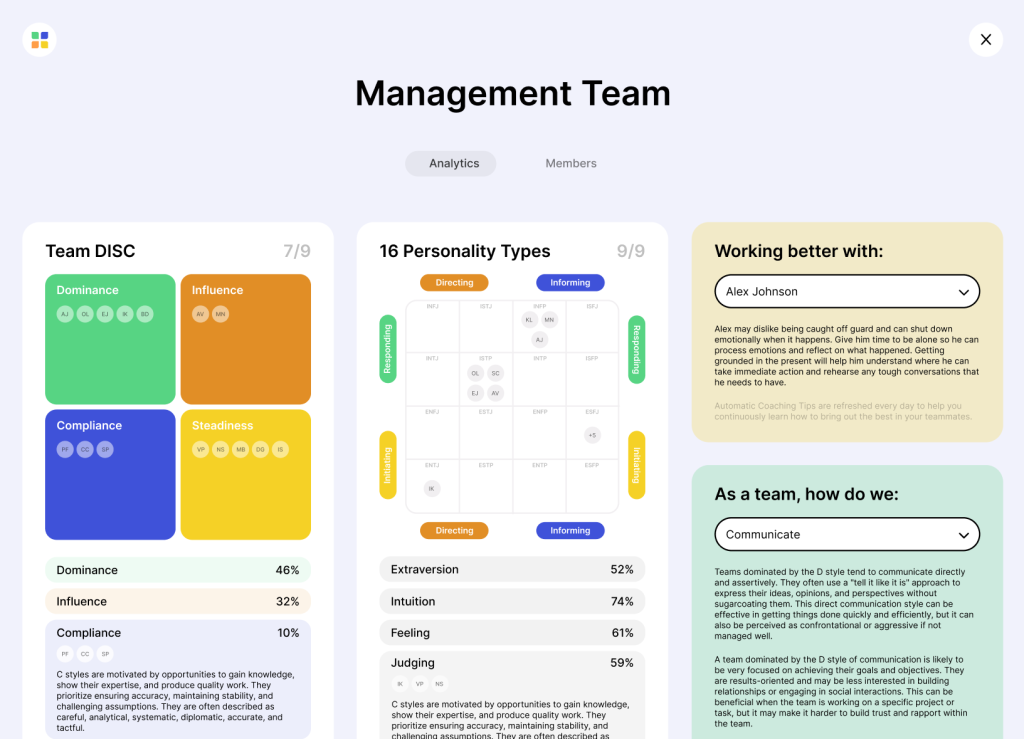Extraversion (E), Intuition (N), Feeling (F), and Perceiving (P) are the four basic personality traits of people with ENFP personalities.
ENFP personality is one of the 16 personality types from the Myers-Briggs personality inventory (MBTI).
Generally, individuals with ENFP personalities are characterized by charismatic, enthusiastic nature, great communication skills, and a desire to help people around them.
However, these characteristics are expressed in different ways in the two subtypes of ENFP.
ENFP personality is divided into two subtypes – ENFP-A and ENFP-T. ENFPs in general, are also called the Campaigners or Encouragers and respectively, and you can also find these subtypes with the names of Assertive Campaigners and Turbulent Campaigners.
The main difference between them is that Assertive Campaigners tend to feel more confident in their skin, while Turbulent Campaigners are rather anxious, finding it harder to cope with everyday stressors.
Still, both subtypes of ENFP personality are eager to connect with other people emotionally.
In this article, we’ll compare ENFP-A and ENFP-T personalities, point out the major differences between these two subtypes of Encouragers and discuss the best and worst career paths for them.
Differences Between ENFP-A and ENFP-T
Assertive and Turbulent Campaigners share the basic four personality traits. They are both warm, empathetic, communicative people with a deep imagination and a tendency to overthink many aspects of their lives.
They usually find it hard to follow rules and have a strong desire to explore the world.
However, these personality traits are usually expressed in different ways in the actions and thinking patterns of ENFP-A and ENFP-T subtypes.
In this section, we will compare the differences between Assertive and Turbulent ENFPs in various social relationships and at the workplace.
Friendships
Both ENFP-A and ENFP-T personalities are extremely supportive friends. They value friendships and can’t imagine living without giving their friends a hand whenever they need it.
They’re considered as cheerful, caring friends who are completely dedicated to sacrificing their own needs in order to help their friends feel better.
- Assertive Campaigners easily reach out to their friends for help when they feel they lose control over things. They are more rational than Turbulent ones and realize that interacting with friends will help them maintain positive focus during tough times.
- Turbulent Campaigners rarely share their emotions with friends. They always try to help their friends during hard times. But ENFJ-Ts have problems, they tend to deal with these problems all alone. As a result, sometimes they feel like they care about their friends more than their friends care about them, which makes them feel lonely.
Relationships
Deep dedication, loyalty, and emotional engagement are some of the most common characteristics of ENFP in relationships.
Generally, Encouragers are empathetic people who consider love as something vital for functioning effectively. They are searching for their soulmates from a young age.
Whenever they feel an emotional connection with another person, they start sharing their emotions and taking care of their partners, in order to pursue their dreams.
- Assertive Campaigners have more control over their emotions in the relationships. They may realize that they’ve already fallen in love with someone but in the beginning, they try to think rationally and control emotions. Once they realize they actually care for this person, ENFP-As no longer refuse to share what they feel.
- Turbulent Campaigners are very impulsive lovers. Unlike people with ENFP-A personalities, ENFP-Ts behave according to their current state of mind and share their feelings without hesitation. Sometimes it’s harmful to their relationships. For example, if their partner doesn’t respond in the same way, Turbulent ENFPs feel disappointed.
Workplace
ENFP-A and ENFP-T personalities are both some of the most appreciated members of the collective at the workplace.
The reason is that they try to take care of their colleagues, inspire them, and bring innovative ideas to the working environment.
Regardless of their position, they are eager to help others solve problems effectively and get promoted.
- Assertive Campaigners have better organizational skills than Turbulent Campaigners. Although they also hate following the rules, maintaining focus on their duties is easier for ENFP-As. They have great skills in managing stress at the workplace.
- Turbulent Campaigners often feel stressed about the workplace if they have too many duties. They always try to focus even on the small details but sometimes taking care of everything is impossible. As a result of being obsessed with little details, they often feel stress at the workplace.
Working in a Team
Individuals with ENFP-A and ENFP-T personalities tend to enjoy working in a team. The reason is that they want to get to know other people and explore their points of view.
- Assertive and Turbulent Encouragers are naturally great communicators who have a strong desire to collaborate with others and help them grow. While working in a team, they motivate the members to reach the collective goal together.
- Even though Assertive Campaigners find it difficult to follow the team’s rules, they realize that the team needs discipline and structure in order to succeed. Therefore, they manage to adapt to the team’s requirements while collaborating with others.
- Turbulent Campaigners can’t really thrive while working in teams. Although they help the team to generate innovative ideas and solve problems effectively, they seek approval from the members before they make decisions.
ENFP-A Strengths and Weaknesses
ENFP-A subtype shares the general ENFP strengths and ENFP flaws but as a result of its assertive nature, these strengths and weaknesses are characterized by some specificity.
The most obvious strength is that ENFP-A has a confident and forceful personality which is represented in all the ENFP-A strengths. Let’s review these strengths one by one.
- Strong leadership skills – Assertive Campaigners are confident leaders. They admit to having excellent communication skills and use these skills to engage the team into achieving the collective aims.
- Dealing with stressors effectively – Assertive Campaigners don’t worry too much about tiny details in their everyday lives. They look at things from a broader perspective compared to the ENFP-T subtype and have efficient strategies to deal with various problems.
- Being independent – Assertive Campaigners enjoy collaborating with others but they have a completely independent nature. They don’t seek approval from others to make decisions and rely on themselves completely during hard times.
Assertive Encouragers also have some character flaws they should work on:
- Too much control of emotions – ENFP-As don’t let their emotions guide them. Sometimes they feel the need to share their emotions but feel the urge to control themselves.
- Unfocused – Assertive Campaigners often lose focus on important things as a result of paying very little attention to details.
- Hardly accept the truth – ENFP-As are overly optimistic people who believe in the kindness of people. But sometimes this makes it hard to accept the undesired reality. As a result, they often neglect the truth.
ENFP-T Strengths and Weaknesses
Turbulent personalities are generally considered unstable people who rarely manage to control themselves. However, people with ENFP-T personalities have plenty of character strengths as well.
Here are some of the ENFP-T strengths they should rely on in order to flourish:
- Focus on details – Turbulent protagonists tend to worry so much about the details. While it can be stressful sometimes, we can also consider it as a strength because it helps ENFP-Ts not to miss anything and succeed in whatever they do.
- Great imagination – Turbulent protagonists reject the traditional ways of solving problems. They always rely on their imagination to come up with creative ideas.
- Perceptive nature – ENFP-Ts acknowledge others’ emotions and thoughts. They always consider others’ feelings while making decisions.
Again, Turbulent Encouragers also have some character flaws they should work on in order to develop:
- Clinging on their mistakes – Turbulent Protagonists think too much about their mistakes. They find making mistakes too painful and rarely deal with overthinking about the past.
- Lack of control – Turbulent Protagonists can’t control their impulses. They often make decisions according to their current emotional state, ending up regretting these decisions.
- Seeking approval – Turbulent Protagonists depend on others. When an important change occurs, they seek approval from others before taking a step forward.
Jobs and Career Paths for ENFP-A
Assertive Encouragers are independent people but they also enjoy communicating with people.
Therefore, an ideal working environment for ENFP-As means an opportunity to perform all the tasks on their own but having an ability to help others.
They enjoy a friendly working environment with a great diversity of tasks and challenges. Similar to ENFP-Ts, Assertive Campaigners hate when routine jobs restrict their creativity.
Here are the most suitable career paths for Assertive Campaigners:
- Graphic Designer
- Journalist
- Politician
- Massage Therapist
- Childcare Center Director
- Flight Attendant
- Travel Agent
- Producer
Jobs and Career Paths That ENFP-A Should Avoid
Some jobs are just not suitable for this personality.
Here are some jobs that you shouldn’t do as ENFP-A:
- Flight Engineer
- Farmer
- Police Officer
- Chemical Engineer
- Software Engineer
Jobs and Career Paths for ENPF-T
Turbulent Campaigners are deeply interested in people. Due to their empathy, ENFP job paths often include positions that require helping other people.
These could be a career path of a therapist, psychologist, social worker, or other-service oriented jobs.
On the other hand, there’s a low probability that Turbulent Campaigners will achieve success if they work in routine jobs. Therefore, they should avoid career paths that involve strict discipline and routine tasks.
Here are the most suitable career paths for the ENFP-T personality subtype:
- Social Worker
- Psychologist
- Fitness Instructor
- Animal Trainer
- Midwife
- Health Educator
- Music Director
- Nutritionist
Jobs and Career Paths That ENFP-T Should Definitely Avoid
There are, however, some careers that don’t suit this type of personality.
If you are an ENFP-T, avoid the following careers:
- Dentist
- Chemist
- Civil Engineer
- Judge
- Systems Analyst


